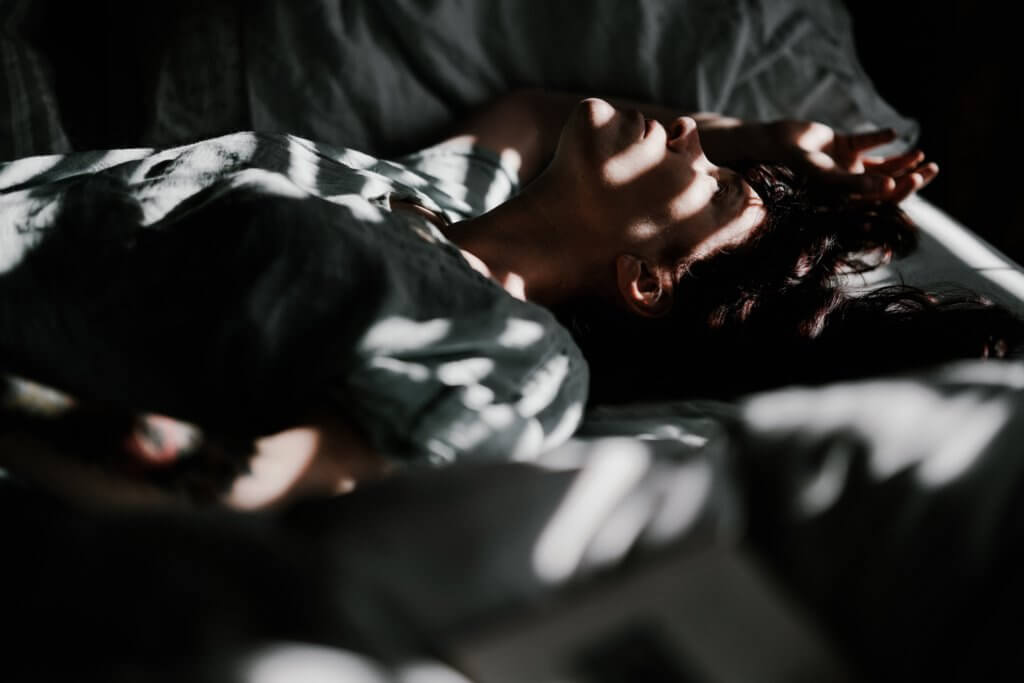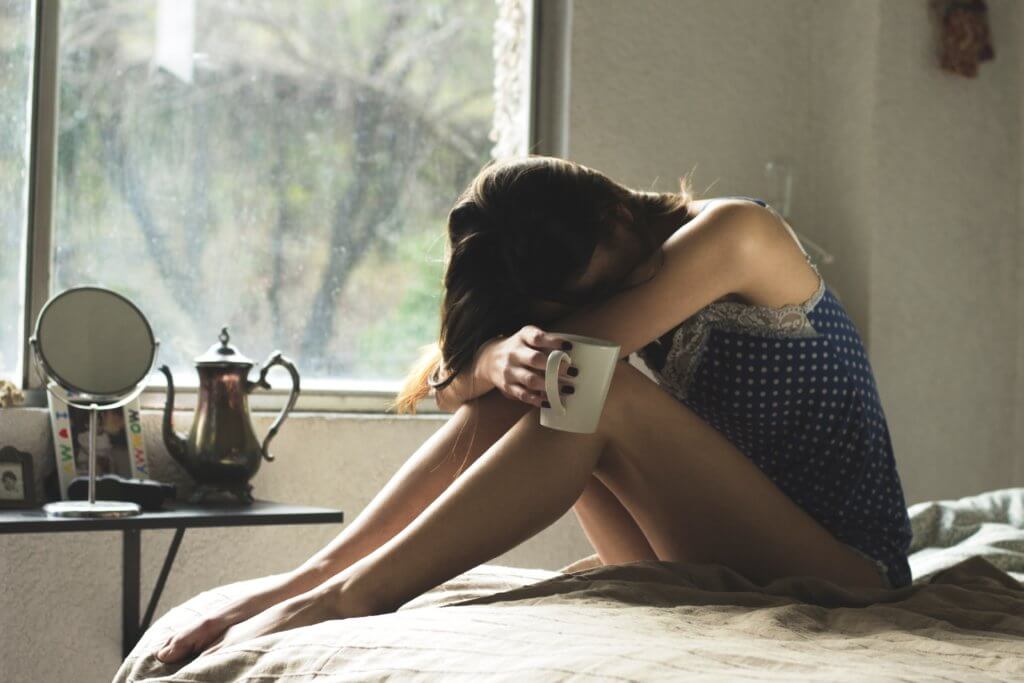Migraines are the 3rd most common and 6th most debilitating illness in the entire world.
Over 90% of migraine sufferers are unable to live their normal lives when they are hit with a migraine.
1 in 4 women will experience migraine headaches during their lives, and 85% of them will develop chronic migraines. (1)
A migraine is far more than just a bad headache, and menopause can cause it to be much worse.
Today, we’ll explore this debilitating illness and look at ways you can alleviate migraines effectively.
What Is A Migraine?
A migraine is a severe headache that can cause extremely painful throbbing or pulsing in the head. Generally, this pain is felt on just one side of the head.
Often, these migraines present with nausea and vomiting and those who are suffering from the migraine are very sensitive to light and sound.

Migraine headaches can cause people who suffer from them to become temporarily disabled from the pain. This pain can last for hours or even days at a time.
Migraines usually begin in childhood, though not always. Up to 10% of school-aged children suffer with migraine headaches. Girls are far more likely to suffer from migraines than are boys, and this probability increases after puberty. (2)
Sometimes migraines don’t begin until after a trauma to the head, or some other sort of injury.
Signs And Symptoms Of A Migraine
There are two types of migraines. One type will present with an aura and the other will not.
An aura can cause you to have trouble with your senses, specifically your vision.
If your migraine headache presents with an aura, you might experience the following:
- Temporary inability to see clearly
- Trouble clearly speaking
- See shapes or bright spots in your vision, often described as crystals
- Feel tingling in your arms, legs or face
Many people who suffer from migraine headaches will show signs of the oncoming migraine a few days before the pain actually hits them.
Some symptoms that can be warning signs are:
- Irritability
- Stiffness in the neck
- Feeling depressed
- Having low energy or being fatigued
- Excessive yawning
- Cravings for specific foods
- Feeling hyper
When a migraine headache attack hits, you will probably find yourself in extreme pain. The symptoms you suffer from during this period can last for a few hours or a few days.
Some of the symptoms you might experience are:
- Throbbing pain in your head
- Pain in one spot of your head, on either side, in the front or back, or right in your temples
- Feeling nausea and needing to vomit
- Extreme sensitivity to light and sound
- Feeling dizzy
When you have nausea and dizziness together with a migraine, it can be extremely unnerving and make the pain more intense. 40 % of migraine sufferers report vertigo in tandem with their migraine headaches. (3)
What Causes A Migraine?

There is no clear consensus on what causes a migraine headache as different people are triggered by different things.
Recent research tells us that migraines are often triggered by chemicals and hormones in the brain. Estrogen and serotonin are key players in the suffering of migraines.
Some research has shown that fluctuating levels of estrogen contribute to the contractions of blood vessels in the brain. This leads to pain and migraine headaches. (4)
Here are a few migraine triggers…
- Specific foods, such as cheese
- Certain drinks, such as wine
- Caffeine (though this can cause or treat migraines, depending on the person)
- Stress
- Lack of sleep
- Hormonal shifts during menstruation or menopause
- Changes in the weather
- Flashing lights
One key trigger is fluctuating hormones, and that is exactly what is happening to you during menopause. Estrogen and other hormones are dropping and that can result in lack of sleep, stress and other menopause symptoms that can result in further painful migraines.
Migraines And Menopause
Every woman is different and will experience menopause differently. Some women will be plagued with migraines and others may never experience a single one.
If you’ve lived with hormonal migraines your entire life, you might find they are less severe after menopause when you no longer have monthly hormonal shifts. If you’ve never experienced a migraine before, you might begin to have them during perimenopause due to the hormonal fluctuations that come with this stage of life.
Often, migraines will cease once your body has gone through the change entirely. Once your hormone levels settle and remain low, the reduction in fluctuations can lessen or even eliminate the migraines you experience. (5)

Hormone replacement therapy is often a treatment for migraines during menopause but be aware that this can often trigger migraine headaches as well.
10 Ways To Reduce A Migraine
If you are suffering through migraines from menopause, here are ten ways to help reduce a migraine.
- If it is not a trigger of yours, try caffeine. Either a small cup of coffee, or a migraine headache medication containing caffeine.
- Rest in a quiet room. Close the door to dampen down any loud noises.
- Make sure the room is dark. Draw the curtains and shut off the lamps.
- Try temperature changes. Take a warm shower or use a heating pad on your neck. Alternatively, use a cool rag on your forehead or wherever the pain is worst.
- If the motion doesn’t make you sick, try some neck rolls and head turns to release the tension in the muscles in your neck.
- Try to relax. Practice some meditation or guided breathing exercises.
- Have a family member or friend massage your neck and shoulder muscles.
- Give acupressure a try. Use your thumbs to apply pressure at the base of your skull. Rub in small circles to try to relieve the pain.
- If you can travel, consider having an acupuncture session. An acupuncturist can place needles in specific spots to help alleviate the pain you are feeling.
- Sleep. If you can, try to fall asleep so that you can rest the migraine headache away without being bothered by stimuli.
Tips To Avoid A Migraine
Once you’ve had a migraine, you will want to do whatever it takes to make sure you don’t experience it again. There are some simple things you can do to help avoid a migraine from menopause in the future…
Learn what your migraine triggers are. Specialists recommend keeping a migraine journal so you can keep track of how often you are experiencing these headaches, as well as try to learn what is responsible for causing them. (6)
Once you know what your triggers are, do your very best to avoid them. You won’t be able to avoid every potential stressor, but you can certainly cut down on cheese or drink less coffee if it helps to curb your migraines.
Make sure you are getting enough sleep. Sleep deprivation can lead to all sorts of problems, including stress and migraines. (7)

Talk to your doctor about medication options. There are plenty available, and you and your doctor can work together to find one that will work for you.
REFERENCES
- http://migraineresearchfoundation.org/about-migraine/migraine-facts/
- http://migraineresearchfoundation.org/about-migraine/migraine-in-kids-and-teens/
- https://www.healthline.com/health/migraine/severe-acute-migraines-vertigo-nausea
- https://www.hopkinsmedicine.org/healthlibrary/conditions/nervous_system_disorders/how_a_migraine_happens_85,P00787
- https://www.menopause.org/for-women/menopauseflashes/women’s-health-and-menopause/my-oh-migraine-hormonal-headaches-menopause
- https://www.webmd.com/migraines-headaches/headache-diary
- https://www.ncbi.nlm.nih.gov/pmc/articles/PMC4998727/



